
In the spring semester —really in January 2020— I’ll be offering a short course on the doctrine of the Holy Spirit at Biola’s Talbot School of Theology.
It’s a course based on the annual Los Angeles Theology Conference, and it’s the easiest course in the world to design because LATC is already designed to be a two-day, topically focused machine for the delivery of theological content. Over the years, a number of local schools (Talbot, Azusa, Gateway) have offered courses that revolve around attending LATC.
The course basically sets students up to be ideal conference attenders, and to get the most out of the two-day event. In advance of the conference, they read a book by as many of the speakers as have recent book in print on the topic. They write reflection papers on each book, attend the sessions, and then write a synthesis paper surveying what they learned at the conference.
For the 2020 conference, here’s what we’re reading in advance:
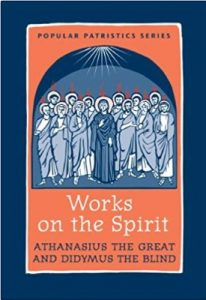 Athanasius and Didymus, Works on the Spirit (St. Vladimir’s Seminary Press). No, we don’t have these ancient Alexandrians speaking at our conference. But I wanted to ground our studies in something patristic, and I opted for these two texts in one fine volume because they deserve to be better known, and I want to do my part. They narrowly edged out Basil’s On the Holy Spirit. Assigning patristic texts reminds me to point out how this LATC course is, in general, a great counterpoint to our Master of Arts, Classical Theology program: in that program we read classic texts with a strong emphasis on the pre-modern. But at LATC, students get to meet a dozen living theologians and get some exposure to what’s happening right now.
Athanasius and Didymus, Works on the Spirit (St. Vladimir’s Seminary Press). No, we don’t have these ancient Alexandrians speaking at our conference. But I wanted to ground our studies in something patristic, and I opted for these two texts in one fine volume because they deserve to be better known, and I want to do my part. They narrowly edged out Basil’s On the Holy Spirit. Assigning patristic texts reminds me to point out how this LATC course is, in general, a great counterpoint to our Master of Arts, Classical Theology program: in that program we read classic texts with a strong emphasis on the pre-modern. But at LATC, students get to meet a dozen living theologians and get some exposure to what’s happening right now.
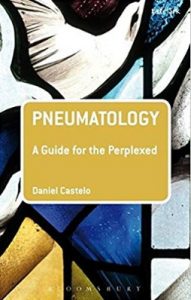 Daniel Castelo, Pneumatology: A Guide for the Perplexed (T.&T. Clark, 2015). For a course on the Holy Spirit, we would need some kind of survey of the territory, and it just so happens that one of our plenary speakers, Daniel Castelo from Seattle Pacific, has authored one pretty recently. Castelo will be speaking on pneumatological epistemology at the conference, but students will already have read his guidebook and will be, we hope, unperplexed.
Daniel Castelo, Pneumatology: A Guide for the Perplexed (T.&T. Clark, 2015). For a course on the Holy Spirit, we would need some kind of survey of the territory, and it just so happens that one of our plenary speakers, Daniel Castelo from Seattle Pacific, has authored one pretty recently. Castelo will be speaking on pneumatological epistemology at the conference, but students will already have read his guidebook and will be, we hope, unperplexed.
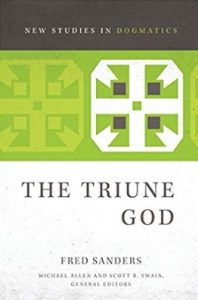 Fred Sanders, The Triune God (Zondervan, 2016). LATC 2020’s title, “The Third Person of the Trinity” indicates that we are approaching the doctrine of the Spirit as one element in the Christian doctrine of God the Trinity. At the conference, Sanders will be elaborating a pneumatology shaped by the eternal processions within the Trinity, and the temporal missions for us and our salvation. This book provides the background and framework for that account.
Fred Sanders, The Triune God (Zondervan, 2016). LATC 2020’s title, “The Third Person of the Trinity” indicates that we are approaching the doctrine of the Spirit as one element in the Christian doctrine of God the Trinity. At the conference, Sanders will be elaborating a pneumatology shaped by the eternal processions within the Trinity, and the temporal missions for us and our salvation. This book provides the background and framework for that account.
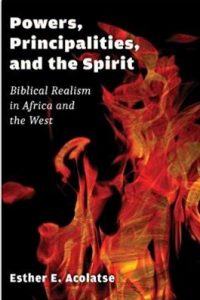 Esther Acolatse, Powers, Principalities, and the Spirit: Biblical Realism in Africa and the West (Eerdmans, 2018). Acolatse takes up biblical language about supernatural forces and asks a fascinating question about how to read it: are the most helpful current resources to be found in African Christian life and thought, or in the critical and demythologizing strategies of the modern, developed West? At the conference, Acolatse will be making an argument about how to think about relationality both within God and toward God. This book establishes some of the categories and method she’ll be employing.
Esther Acolatse, Powers, Principalities, and the Spirit: Biblical Realism in Africa and the West (Eerdmans, 2018). Acolatse takes up biblical language about supernatural forces and asks a fascinating question about how to read it: are the most helpful current resources to be found in African Christian life and thought, or in the critical and demythologizing strategies of the modern, developed West? At the conference, Acolatse will be making an argument about how to think about relationality both within God and toward God. This book establishes some of the categories and method she’ll be employing.
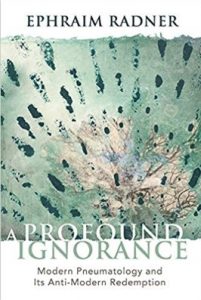 Ephraim Radner, A Profound Ignorance: Modern Pneumatology and Its Anti-modern Redemption (Baylor, 2019). This book does not yet exist at the time that I’m putting it on the syllabus, so all I can say is, it better be good. I’m assigning it without having read it, on the strength of Radner’s previous outings, and on teh basis of having heard him speak on the subject at other conferences in recent years. At LATC 2020, he’ll be speaking on a closely related theme, “Modern Pneumatology and its Discontents.”
Ephraim Radner, A Profound Ignorance: Modern Pneumatology and Its Anti-modern Redemption (Baylor, 2019). This book does not yet exist at the time that I’m putting it on the syllabus, so all I can say is, it better be good. I’m assigning it without having read it, on the strength of Radner’s previous outings, and on teh basis of having heard him speak on the subject at other conferences in recent years. At LATC 2020, he’ll be speaking on a closely related theme, “Modern Pneumatology and its Discontents.”
Well, that’s the class. If you’re at Talbot, sign on up. If you’re at a nearby school, copy this plan and build a course around LATC; bring your students and let us do the teaching and the intense contact hours for you. If you’re out in internet land, I don’t yet have a plan for your life, but at least you know we’ll have a book on pneumatology forthcoming from Zondervan on the basis of the conference.